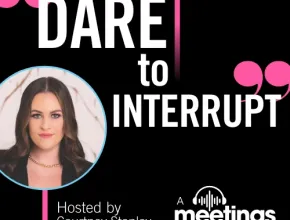What Will Hotels and Conferences Look Like Post COVID-19?
Coronavirus has crippled the U.S. and global economy, with the hospitality industry especially hard hit. Estimates predict that 4 million hospitality jobs could be lost before the pandemic runs its course.
After COVID-19 is in the rear-view mirror, how will the meetings and hotel industry have changed forever? What will be the proverbial “new normal?”
Meetings Today Contributing Editor Robert Nieminen discussed what this new world may look like with top designer Michael Suomi, founder of Suomi Design Works, for this Meetings Today Podcast.
From social distancing to a hyper-aware focus on cleanliness, the world of hospitality design and the meetings and conventions experience may never be the same.
See all of our coronavirus coverage. Enjoying this episode? View more episodes of the Meetings Today Podcast!
Also available on iTunes, Google Play and Pocket Casts.



Rather read the conversation? See the transcript below:
[Start transcript]
Robert Nieminen: Hello, everyone, and thanks for tuning in to the Meetings Today Podcast. This is Robert Nieminen, contributing editor for Meetings Today, and I hope you are doing well and staying safe amid all the social distancing and sheltering in place that's going on.
It's really such a challenging time for everyone right now, and we hope to be a positive voice in the midst of all the noise in the media out there.
Personally, I know so many restaurant workers here in South Florida who've been laid off, as the industry has been particularly hit hard by all of this. To share some thoughts on the impact this is having on the hospitality industry and how it will evolve moving forward, I've invited Michael Suomi, former principal at Stonehill Taylor, who recently founded his own firm, Suomi Design Works, to join me. Michael, thanks for being here.
Michael Suomi: Well, thank you for having me.
Robert: Yeah, absolutely, it's great to have you. So Michael, I know you're based in New York City, and from some of the pictures that I've seen online of the empty streets in Manhattan, I’m just kind of blown away. It's really hard to imagine. How are you doing? And how has this impacted you and your firm, which you actually just launched last November, correct?
Michael: Yeah, six months ago I launched Suomi design works and it took off fast, and then in January, when we started to sort of learn about the virus in China and that it was starting to spread, I started thinking about that, and in early March I closed my office down.
It was about a week before New York City announced the shuttering of all non-essential businesses, and I just felt like I'd better test this out. I had designed my office to be run remotely and all the workers to be able to easily work remotely from day one, just because we travel so much in this industry. And I sort of ran a test of everyone working from home, and so since about March 6, my office in New York has actually been closed and my staff has been working remotely.
I'm actually also in South Florida. My daughter and I had a spring break ski trip that we left for on March 12. We went to Colorado, and the day we arrived at the ski resort they announced the shuttering of all ski resorts across the United States. So my daughter and I have actually come down to southern Florida, to southwestern Florida, and we are self-quarantining at my girlfriend's place, just south of Sarasota.
[Related Meetings Today Podcast: Pro Tips for Working and Managing From Home During the Coronavirus Crisis]
Robert: Yeah. Well, I'm sorry to hear your vacation plans got spoiled, but it sounds like you guys had great foresight in testing out the work-from-home before it was actually forced on you. So I'm glad to hear that.
But as far as the big picture, Michael, what are you seeing right now happening in the hospitality industry as it relates to the COVID-19 pandemic? Do you have a sense of how big the impact of this is or will be on the industry?
Michael: Well, the hospitality industry has really been devastated by COVID-19 in the U.S., as well as everywhere else in the world. From everything I've been reading and learning about and the folks that I know that head up their companies, which are major companies—hotel companies—the hospitality industry is one of the hardest hit industries. And that was really due to the fears of community spread through travel and group events.
Very quickly, events of all sizes were canceled, which I'm sure you and the listeners are very aware of, and the impact on the hotel industry was almost immediate in terms of room cancellations. And major hotel industries saw that this pandemic was causing this and that governments were requiring shutdowns, and so they allowed the cancellation of reservations and events without penalties, in a goodwill gesture.
Right now I think most hotels In the U.S. are closed, and those that remain open are at about 20% of their regular capacity. I have a few stats, which are shocking, and I had put them together for a talk I did last week.
Right now the U.S. hotel industry is losing $3.5 billion per week. The American Hotel and Lodging Association estimates almost 4 million jobs will be lost. Most of those have already been lost, but it will reach about 4 million jobs.
And then, you know, the big hotel companies in the U.S.—Marriott, Hyatt, Hilton—those companies alone have furloughed hundreds of thousands of workers both at the property level and at the corporate level. It's a really, really hard-hit industry and the impact was almost immediate.
[Related Meetings Today Podcast: Panel Discussion: COVID-19 and the Meetings Industry]
Robert: Wow, yeah, the data there is just so devastating. It's almost difficult to wrap your head around how big of an impact this is truly having on the hospitality industry and so many others as well.
What have you been hearing about the way that designers are considering how this pandemic will change the way hotels, bars and restaurants, meeting spaces, are going to be designed going forward? Do you think footprints will expand to allow for social distancing, or will they contract to have less people indoors, or will there be greater design with sensitivity to the spread of infection? What do you see going forward from here?
Michael: I think that's a really good question that I'm not sure can be completely answered, because we don't know what coming out of this pandemic actually looks like.
But I have been thinking about that a lot. I've been talking with people in the hotel industry about that. I've been hearing what some companies like Hyatt are planning to do. And I think it sort of falls into three or four buckets. Social distancing, of course, is probably the biggest one. And there are a lot of hotels that are out there that existed before that are set up already for social distancing, like small resorts where there are individual villas that have a lot of space between them. And I've been to quite a few of those kind of resorts in the U.S., and also hotels that just have a smaller number of rooms are set up for creating individual spaces for guests where they rarely ever see anyone else.
But the vast majority of hotels are built with many floors and elevators that people pack into, and narrow corridors that lead to hotel rooms and you're inevitably passing very close to other people—sitting in bars and restaurants in hotels, attending events, you know, a 600-, 700-person business meeting in a ballroom at a hotel. What will that look like in the future?
So I think social distancing is an area that will be explored if that remains part of how we move into recovery. Something as simple as pulling up in a car and having a valet take your car and park it in the hotel garage—that'll have to change. I don't think people would want that to happen if we still have to maintain distances.
Checking in; a lot of hotels had been adopting, slowly adopting, remote check-in or self-check-in from kiosks and using direct-to-room technology. Have you ever done that, Robert, where you pre-check-in and use your phone to unlock a door?
Robert: I haven't done that yet, but I've heard about it, yeah.
Michael: It's a small percentage of the hotels out there that actually have that system in place. It's expensive and it works quite well. There are issues regarding security, but I think something like that is going to get pushed out very quickly, where you can just bypass the receptionist and dealing with a front desk.
And, you know, hotels are about bringing people together and about travel and tourism, and I think travel and tourism is going to be impacted for quite a while.
Another area that I think we may see design shift into has to do with cleanability and the things that are easy to clean, and you can tell that it's been cleaned. That’s both in the hotel room and in the public area.
One of the biggest hotel companies in the U.S. has been talking about how they're going to change when they clean public areas so that when guests are there, they want to have people out cleaning the public area; they usually do in the middle of the night when everyone is asleep and no one sees people, staff out there with spray bottles and rags. They want to be able to show that they're cleaning everything.
Something that comes from the medical world, which I think will be another area that will be explored, is antimicrobial materials and surfaces. And that's been very prevalent in hospital design, healthcare design, for a long time. And those are materials that inherently, either through chemicals that are added to them or just that by the nature of the natural materials in them, kill microbes and viruses and germs on contact—like copper, for example, kills a lot of things.
And there are chemically treated fabrics and floor finishes and wall finishes that are used in hospitals that may be considered for hospitality to give a guest sort of a higher level of confidence that there aren't viruses sitting on a counter in their guest room.
Robert: Yeah, and that's a really interesting point you made about the hotels having the cleaning staff out in the public spaces where people can see them.
During our podcasts—or, I'm sorry, our webinar earlier this week—some of the panelists were talking about the fact that even as people return to work, just that it's important how there should be that perceived sense of safety and cleanliness that people don't have to worry as they're going back to work that the spaces that they're inhabiting are going to be, you know, carrying the virus or whatever it is. So yeah, that's a really important thing that I think is going to be for hotels and for other spaces going forward.
Michael: Yeah. You know, the other area has to do with face coverings like covering your mouth and your nose, wearing gloves. Will that be part of our life after the pandemic starts to recede? And how would that play out in the hospitality world?
I think these are all really great areas to explore from a design standpoint, but I don't think any hotel here or major hotel company is going to jump on any of these areas until we all sort of know what is going to what it's going to look like after the pandemic recedes.
[Related: Inspiring Stories from the Meetings Industry During the Coronavirus Crisis]
Robert: Yeah, no, I think you're right. It's a little too early to tell exactly what's going to happen. Obviously, no one really knows. But you had made some really good points there about how the hospitality industry might be impacted. And even at this stage and looking ahead a little bit
So before the COVID pandemic hit, I know that you were involved with a project called Hospitality on Edge . What is that initiative all about? And can you tell our listeners a little bit about what inspired it as well?
Michael: Sure. It sort of came out of the fact that the hotel industry has been traditionally slow to react to certain forces and changes that occur in the world, like the adoption of sustainable design practices—it took quite a long time before hotel companies realized that there's an upside to embracing LEED, for example, as a design process. I wanted to be able to have a venue to talk about things that were happening today, or yesterday, that was taken more or less from the headlines that oftentimes the hotel industry ignores.
But at the same time, these kinds of issues do impact the hotel industry, oftentimes profoundly, and many times the hotel industry reacts very late. It's interesting to see how COVID-19 has very quickly changed the hotel landscape because a lot of the other topics that I had talked about through Hospitality On Edge are well known topics to the general public, but the hotel industry would be very, very slow in adapting.
For example, the first talk I did was regarding the tariffs that were being levied against products being made in China, by the U.S. government, and the trade war that was brewing. This was several years ago. And a lot of people in the hotel industry didn't realize that the tariffs were going to change how things were made and the cost of those things for hotels.
And since then, I've addressed other topics, like climate change was a topic we addressed last fall, and I had a representative from the ownership of a hotel that filed the world's largest Insurance claim due to the destruction of their hotel by two hurricanes that hit the hotel one after another down in the Caribbean; it was a $400 million insurance claim that they were resolving and rebuilding the hotel from scratch, and climate change is another one of those topics that I feel isn't addressed a lot in the hotel world of events and conferences and speakers.
Robert: Yeah, that's true. That's a good point. Why do you think that is, Michael? I mean, why has the hospitality industry been a little bit slow to adopt some sustainability initiatives? And what are some other major challenges that it's facing even outside of this COVID pandemic?
Michael: Well, sustainability has been a major challenge from a standpoint—hotels are notoriously expensive and polluting to build, and then also to run, from a standpoint of water use, energy use, and sustainability has gained a lot of traction, but it can go a lot further.
I think in the world of commercial design, hospitals, mixed-use projects, you frequently see LEED Gold, LEED Platinum, and in hospitality it's still very rare. So sustainability will continue to be a major challenge in hospitality design.
I think this last year the AHLA, the American Hotel and Lodging Association, named human trafficking as their biggest issue that they're dealing with in the U.S. with hotels, and that will be a growing issue. It's unfortunately, I'm sure, been put on the back burner as we've been dealing with COVID-19, as have a lot of issues.
And I think coming out of this pandemic, how hotels are financed, and how banks finance them traditionally—either traditional financing or private equity—I think that's going to be changing quite a bit as well, and how hotels are insured.
You know I think everyone knew that the growing economy that we had here in the U.S. as well as almost everywhere else in the world wasn't going to last forever, but I don't think anyone predicted this is how it was going to end. And, you know, as we come out of this, Robert, I think that there will be some really specific focuses for hospitality that will be in reaction to getting back to life as normal.
And now those are the kind of things we were just talking about, especially social distancing and cleanability. Or the feeling that a place is clean. But I think that definitely financing, how things are made and where things are made for hotels, will be a growing challenge, because where we get things made, the supply chain of products, as a result of COVID-19, was broken in many areas.
There's a lot of stuff that's procured and made and supplied for hotels that comes from various countries in Asia and elsewhere in the world. And having redundant supply chains, I think will be a focus of hotels in the future.
Robert: Yeah, definitely. I think you're spot on there. There's so much to process right now, and I know it can be kind of difficult to have a hopeful outlook. But is there anything, Michael, that you are excited or hopeful about as we think about even coming out of this pandemic, as far as where the hospitality industry is headed. I mean, what makes you excited about the future?
Michael: Well, I mean, some of the best design that’s ever been done has always come out of a challenging set of requirements or rules or restrictions. And, as we move into the next phase of, you know, hopefully coming out of the pandemic, those challenges are going to be an exciting thing for designers to tackle.
And that's what gets design juices flowing—thinking about those kinds of challenges. How do you take something that is inherently social and puts hundreds or even thousands of people together in close proximity? How do you design that so that you can maintain a social distance or separation that's going to make everyone feel comfortable? That's a huge challenge. And that, for me, that's exciting as a designer.
Robert: Yeah, absolutely. I couldn't agree more. And you know, I just personally think that designers and architects and the creative types are just so innovative. And I don't think there's any better group of people to rise up to the challenges that are our world really is facing in these times and going forward.
And I think that the designers and architects are really going to be playing a major role in solving some of these challenges, as you mentioned, Michael, so thank you so much, again, for your thoughts and perspectives and insights. I know our listeners will appreciate it. And thank you again, so much, Michael, for being here. We appreciate it.
Michael: Oh, of course. Thank you for having me, Robert.
Robert: Absolutely. We'd love to have you back anytime, Michael.
Well, that's it for today for this episode, everyone. We hope you tune in again next week. And until then, thanks and be well everyone.
[End transcript]
Access Meetings Today’s entire archive of COVID-19 articles, podcasts and webcasts in one place, here.



